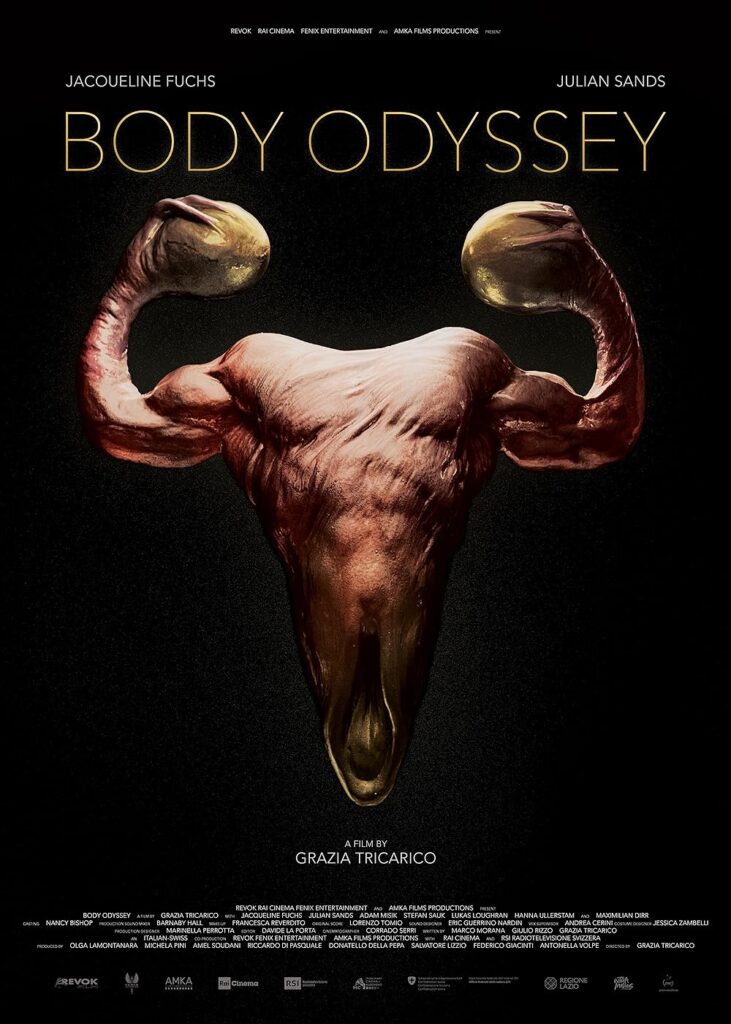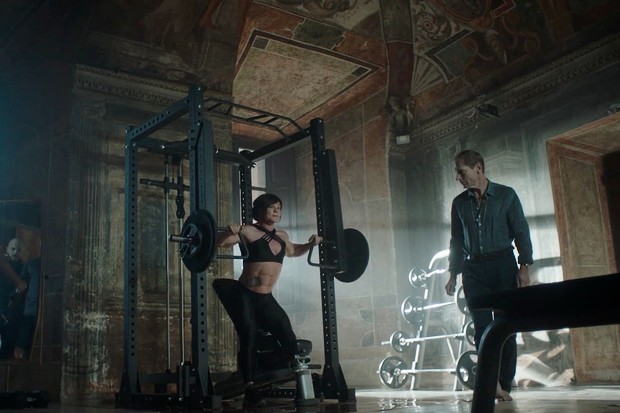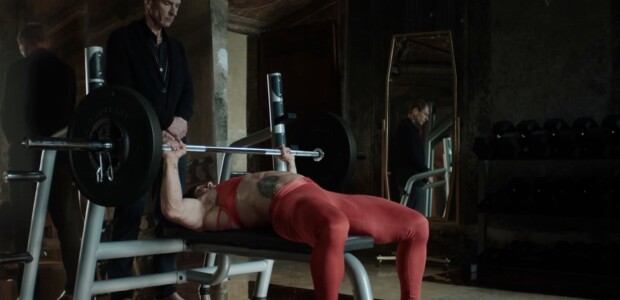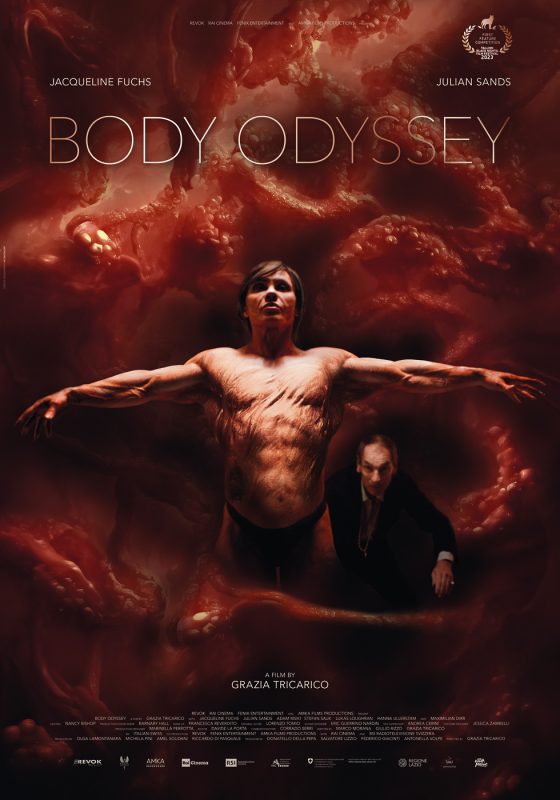It’s difficult to understand when our bodies speak to us. One of the cruelest things the mind can do is misrepresent itself as the needs of the body. When we’re dehydrated, hungry, or sleepy, our body sends signals to our body, to nourish ourselves, or rest. What happens when we feel compelled to eat a whole pizza all by ourselves? Hide in a bathroom purging the food we just ate? Staying in bed all day, overcome with depression? The mind insulates itself from scrutiny by telling us that these desires are needs of the body. Our mind masquerading as our body can be an unreliable narrator. This is a core theme of Grazia Tricarico’s debut film BODY ODYSSEY.

Jacqueline Fuchs plays Mona, a lifetime bodybuilder now in her mid-forties, and her body is a battleground showing all of the ravages of a lifetime of steroid use, excessive anarobic exercise, and intermittent starvation. The film uses scenes between Mona and her physician to highlight the cost she is already paying for a lifetime of bodybuilding. She’s pointedly told by her doctor that the size of her clitoris is a direct result of her steroid use. Throughout the film we hear a low, rumbling voice over which we, the audience, and Mona assume is her body telling her what to do.
Reinforcing her inner voice and guiding her through her grueling competition is Kurt, played by Julian Sands. Sands has always been an extraordinary performer. He elevated genre staples like WARLOCK by breathing life into characters beyond what was found in the script. For my money, his finest performance was in BOXING HELENA, Jennifer Lynch’s formidable examination of male entitlement, the dehumanization of women in performed sexuality and the lack of emotional maturity in western men. It was a vulnerable performance, and Sands explored weakness and ugliness that many performers would be uncomfortable with.

This was why I was so excited to see him here. So much of the shared male sexual experience is the fantasy of the unseen and the unobtainable. Since, for worse, we live in a society under patriarchal social rule, where virtually everything is constrained by enforced gender norms. As I sit here writing this, the Olympics are embroiled in controversy because professional shitbag Logan Paul is asserting that a cisgender women’s boxer is not feminine enough.
Sands guides Mona from form to form as he checks her poses to ready for competition. The tone of his voice is silken and manipulative. When he says “quadricep,” it sounds like he is saying some object of forbidden desire and in a way he is. He curtails Mona’s eating, and at one point, reduces her to only drinking water. He makes the choices about what steroids to inject Mona with, and when she offers any concerns about them, he manipulates her into thinking she can’t accomplish her goals without the steroids. The scenes where he shoots her up with steroids are filmed suggestively, and like so many Cronenberg films before it, there is something penetrative and sexualized about a needle piercing flesh. Kurt may not be having sex with Mona, but he is definitely possessing her. By dictating her workout regimen, what she can eat and drink, when she can have sex, and what drugs to take, he is reshaping her. She’s a monument to his control.
Early in the film, the person that Mona routinely has pre-planned, scheduled sex with suddenly becomes no longer available, and Kurt suggests that he can procure Mona a new approved lover to have scheduled sex with. She bristles at the suggestion. Kurt’s suggestion brings Mona’s choices into focus, the way she’s “listened to her body.” Kurt’s offer comes as a gross overreach in her training regimen. Also, his offer of finding an escort underscores for Mona that the choices she’s made with her body have rendered her undesirable. She views the way she’s reshaped her body under Kurt’s tutelage as an act of self-love and as a pursuit of perfection. It’s frustrating to her that the rest of the world doesn’t react to her body the same way. There’s a scene which thematically pairs nicely with Kurt’s offer to find Mona an escort. She’s in the gym talking with someone about her plans and training regimen when she nods toward an obese man on a treadmill. Her conversational companion asks her, “How do you think he let himself get like that?” Mona relies, “He doesn’t love himself enough.” Then she increases the speed of the man’s treadmill from 3mph to 8mph and tells him to believe himself. Both Mona and the obese man feel disassociated from their bodies. The obese man’s reaction is an attempt to improve his health and reshape his body. Mona doubles down.
It is with a head full of thoughts of increasing loneliness, infertility, and a body in revolt from the stress she’s putting it under that Mona encounters Nick. Nick is much younger than her, and his body doesn’t reflect that intentionally carved shape of a bodybuilder. He reflects a path not taken. Yes, she’s attracted to him, but more importantly, she’s attracted to what he represents. As she pursues her attraction to Nick, the film’s photography grows more surreal, with macro shots of plant life, dark underwater shots, and fog rolling out to the horizon. Surrendering to her instinct, the world seems unfamiliar to Mona’s starved body and the viewer. So much of the look of the film reminded me of David Cronenberg’s DEAD RINGERS. In that film, Cronenberg didn’t quite embrace the supernatural, but instead the way he shot his twin protagonists made their journey abstract and surreal. Tricarico accomplishes the same here. There’s a moment in the film’s third act that I won’t go into detail here as to not spoil its riches, but even though what we see is clearly understood to be hallucinatory, it is no less terrifying and maybe even more scary for understanding that. The body horror experienced by Mona is to have spent a lifetime building a body and then realizing it is a prison.
BODY ODYSSEY makes for an intriguing piece of complimentary viewing to this year’s LOVE LIES BLEEDING and is a fitting final film from Julian Sands. What makes it most worth your time is that Tricarico is an assured new voice in body horror, who understands that body horror need not be sticky to make a point; it need only understand why we are terrified of the flesh machines that contain us.
Tags: Adam Misik, Body Horror, Brian Cartwright, Corrado Serri, Davide La Porta, Giulio Rizzo, Grazia Tricarico, Hanna Ullerstam, Italy, Jacelyn Parry, Jacqueline Fuchs, Julian Sands, Jun Ichikawa, Lorenzo Tomio, Lukas Loughran, Marco Morana, Nicolo Pasetti, Stefan Sauk, Switzerland, Tim Pritchett




No Comments